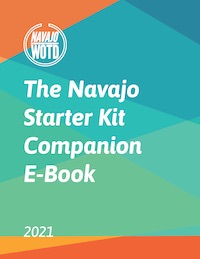bizaad
language
bih zahd
Literally: his words/speech/language.
Components: Bí + saad.
The Navajo language is generally gender neutral, so bí can refer to him/her/it/they. It is part of a paradigm that includes shi ́ and ní (I/me and you, respectively). As a prefix to saad, which approximates to words or speech, it refers most commonly to the language of something, or someone.
Using bizaad in combination with previous words, the following Navajo sentence demonstrates its usage:
Diné bizaad shił yá’át’ééh! I like the Navajo language!
